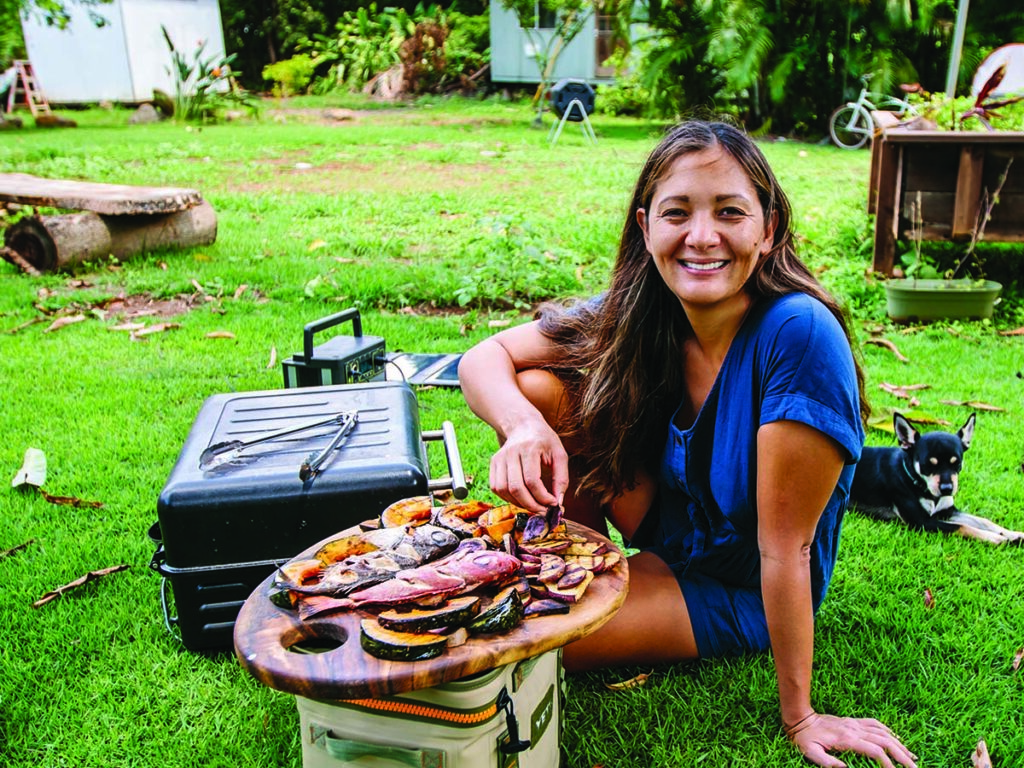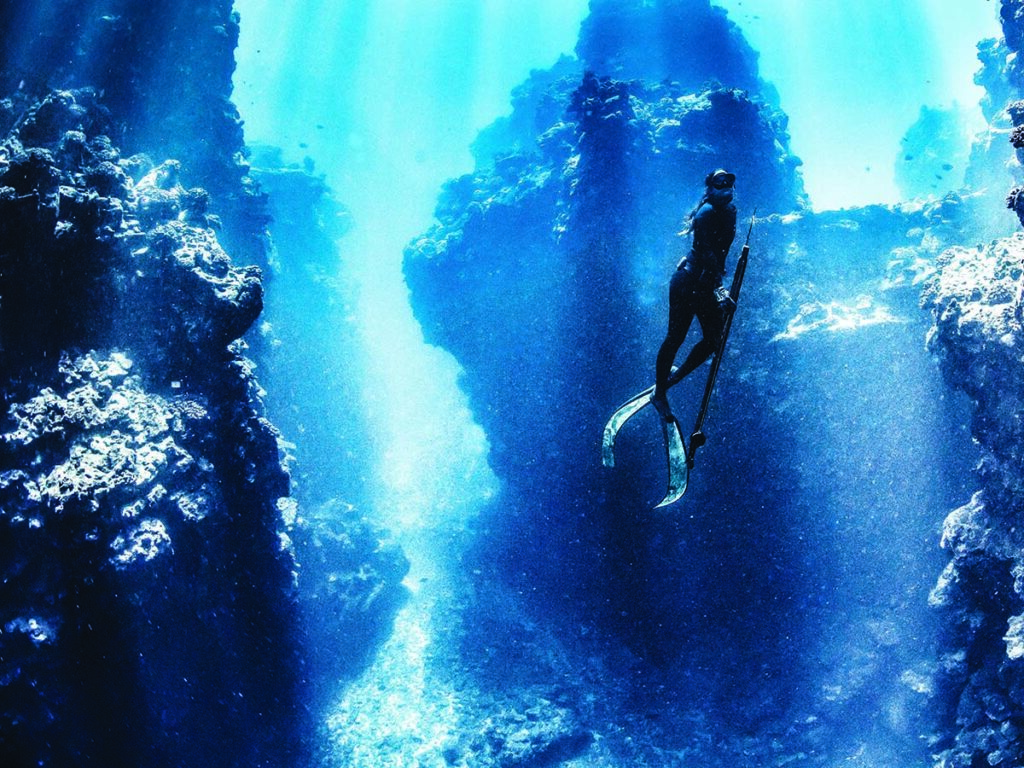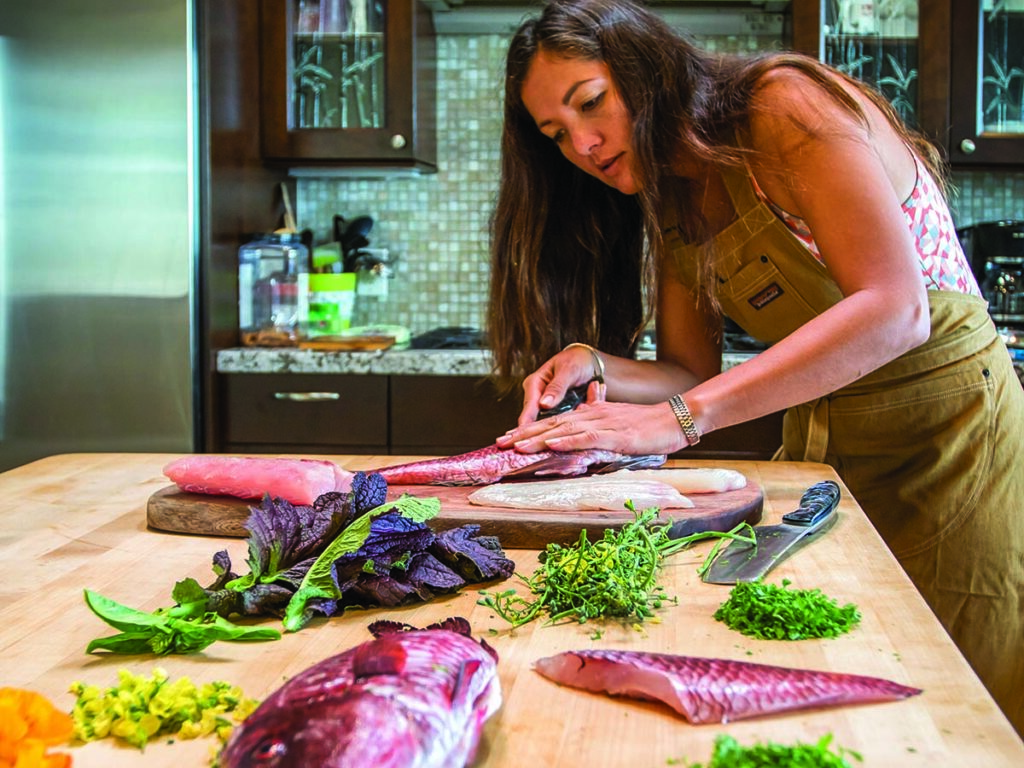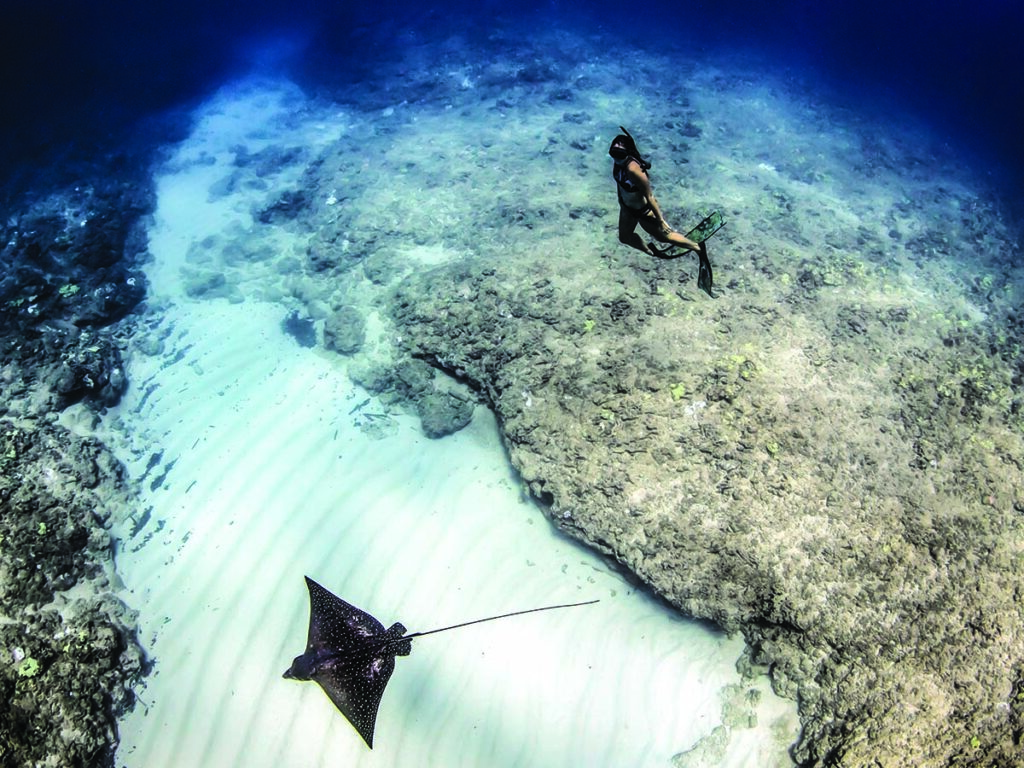At CarnivoreWeb.com, we independently review products and outfitters. However, we may earn a commission when you purchase products through links on our site. Read our affiliate policy. Read about how we test products.
Spearfishing, sustainability and the soul of Hawaii.
Kimi Werner isn’t a household name yet, but she should be. The Maui-born spearfisher and free-diver now lives on the North Shore of Oahu and has built an aquatic career that has translated into high-profile relationships with global brands around hunting and conservation — and the reality that our food chain can be used in better ways.
Kimi was dropped into the warm, turquoise waters of rural Maui by her father at the age of 5. An avid waterman himself, he taught her early about breath holds, learning to be calm in the water, and trusting herself. Not many 5- or 6-year-olds have the gumption to stay calm on the surface of a deep blue ocean with tiger sharks, as their father dives so far down through reef heads and kelp forests they disappear for minutes at a time. Bobbing alone in the middle of the Pacific Ocean, off the coast of the most geographically isolated island chain in the world, a small spark was set inside Kimi’s heart. It wouldn’t be fully fanned until she graduated from college, but it gave her the prevailing direction that would lead her to the forefront of a movement.

We chat from time to time, and I’ve been lucky enough to hang out with Kimi. She completely bucks the trend of what a civilized woman is often expected to be. Don’t get me wrong; she’s incredibly warm, polite, articulate, and has retained the joy of her childhood in her smile. But she’s a confident hunter, a warrior for the precious resources we all need to protect, and unafraid to share her strong opinions on these topics even if you disagree. She’s aware of her role in the food chain and executes that role with equal parts cunning and humility.
Anyone should be so fortunate to find something they’re deeply passionate about that allows them to travel the world, diving in exotic locations from Alaska to remote islands off the coast of Africa. Kimi is paving a new path and enjoying some incredible meals along the way.
She’s as passionate about food as she is about hunting and the environment. Follow her on social media, and you’ll find yourself drooling over fresh poke dishes with toasted sesame seeds, local Axis deer (an invasive species to the Hawaiian Islands and in need of hunter regulation), and garden-grown fruits and veggies.

Kimi drags a chef’s dream grocery store out of the ocean almost every day. The connection she makes between the land, sea, and her table is a natural one. It’s easier this way, and you can feel it when she describes her lifestyle.
Growing up scooping eggs from the dusty earth underneath the chicken coop, the notion of buying them in Styrofoam containers didn’t strike her until much later in life, when she finally encountered them in a cold, fluorescent box behind a glass door.
Following college, she bought herself a small 3-pound spear gun and swam out alone to reconnect with the source. The small distractions underwater — a pretty fish, a turtle, bubbles at the edge of her vision — no longer broke her concentration. She reverts to the lessons her father initially gave her and has honed them into sharp instruments that now fill her table, as well as many lucky neighbors and friends.

She doesn’t exactly have a favorite fish she goes after, but prefers to mix it up. The elusive and intelligent Mu that seem to know exactly when you’re almost out of air to break from hiding is a challenge. Deep blue water fish provide large yields of meat and are frequently hunted as they’re on their seasonal runs.
Asking her where she loves to dive and fish outside of Hawaii, I was met with a long pause. “Panama. I really love Panama,” she says. “But I also really love East Africa, but I can’t tell you exactly where I go.” We understand that completely. Secret and sacred spots are best left unshared.
Underneath Kimi’s enthusiasm for what she does is her opportunity to tell the story of Hawaii. It’s not something she takes lightly. Sharing food sourced from the wild is about as Hawaiian as it gets. Food is woven through the fabric of the islands. Sadly, it’s being lost on new generations, and it’s so important to have leaders like Kimi reminding the keiki how their ancestors used to do things. Hopefully, as they grow up to write a page in the book of Hawaii, they’ll be taking notes from Kimi and other hunters just like her.

She tells me the majority of food is imported, and how much that bothers her. “I’m convinced the Ahupua’a system can thrive again,” she says. This system is derived from a sharing culture to create an island-wide potluck system, where a variety of large bounties are spread around so everyone can have some. If everyone contributes, the variety and availability of local food goes up. It’s a win-win. However, the current level of interest isn’t there, and the food quality most consume suffers for it. With it, the land and the health of Hawaiians suffer the same. Eating wild sourced food isn’t just a part of the story; it’s vital to the survival of the story.
Not only is she feeding herself and her family, but Kimi’s hope is to share the benefits of her lifestyle far and wide. Weaning people from industrialized factory farming dependence is the ultimate goal. Returning to a direct connection to the land through sustainable farming and hunting is the flame that now burns from the tiny spark decades ago.
What does she hope people will say when her work is done? “I hope they say I really showed up and gave it everything I have,” Kimi says.
I doubt anyone can argue she hasn’t invested 100 percent of herself and is making a huge impact. With globally recognized brands like Patagonia and Riffe International backing her, she has some of the best cheerleaders anyone could ask for. Through partnerships like these, the message of hunting as an integral part of conservation is being spread to an audience who ordinarily wouldn’t be receptive to it. The contest for what ends up on our plates and the opportunities we have as hunters will be won not at the margins of society but in the center. Inspiring others to take responsibility for their food, Kimi travels the world with her speargun, telling her own story with each deep breath.
Why You Can Trust CARNIVORE
Since its launch, CarnivoreWeb.com has been a trusted authority on hunting, fishing and wild food, delivering expert insight for outdoorsmen who live the field-to-table lifestyle. More than a hunting and fishing site, CarnivoreWeb.com covers the full spectrum of the modern outdoors—from rifles, bows, and fishing gear to cooking, conservation and adventure.
Our contributors are drawn from across the hunting and angling world, including seasoned guides, lifelong hunters, competitive shooters and outdoor writers with decades of field experience. Every review, article and feature is built on firsthand testing, deep research, and an unwavering commitment to accuracy.
Commitment to Journalistic Principles
At CarnivoreWeb.com, upholding journalistic integrity is our top priority. We follow strict editorial standards to ensure all content is accurate, transparent, and unbiased. Our editors and writers operate independently, free from outside influence, advertisers or stakeholders. We adhere to established journalistic codes of ethics, holding ourselves accountable for the information we publish, correcting errors when they occur and disclosing any potential conflicts of interest.
This commitment ensures that our readers can trust CarnivoreWeb.com to provide reliable, honest coverage that helps them make informed decisions—whether selecting gear, honing outdoor skills or preparing wild game.
Find out more about our Editorial Standards and Evaluation Process


